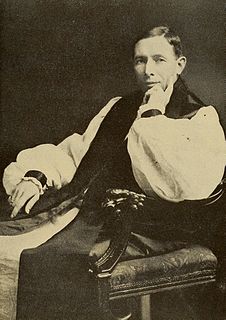A Quote by Thomas Merton
Detachment from things does not mean setting up a contradiction between 'things' and 'God' as if God were another thing and as if creatures were His rivals. We do not detach ourselves from things in order to attach ourselves to God, but rather we become detached from ourselves in order to see and use all things in and for God.
Related Quotes
When we see through the lens of God's truth, revealed primarily in his Word, everything comes into sharper focus. Suddenly, we'll see that everything is integrated and overlapping - that the world is not divided between the sacred and the secular, but there's one life, and God is the Master of all of it. God knows all things, past, present, and future, and is all-wise; when we train ourselves to see more as he sees, we'll pursue the things he values and seek to live before him as our primary audience.
When we believe that we ought to be satisfied, rather than God glorified, we set God below ourselves, imagine that He should submit His own honor to our advantage; we make ourselves more glorious than God, as though we were not made for Him, but He made for us; this is to have a very low esteem of the majesty of God.
The problem of reconciling human suffering with the existence of a God who loves, is only insoluble so long as we attach a trivial meaning to the word "love", and look on things as if man were the centre of them. Man is not the centre. God does not exist for the sake of man. Man does not exist for his own sake. "Thou hast created all things, and for thy pleasure they are and were created." We were made not primarily that we may love God (though we were made for that too) but that God may love us, that we may become objects in which the divine love may rest "well pleased".
It isn't so much that God is the unified state of consciousness that each of us came from and will return to, but more so that God is the creative energy flowing between all states of consciousness. God is in the land beyond the mountains, but God is also in the mountains and in the valley of illusions cradled within the mountains. God is not one thing or another, rather God flows between and through all things.
In order to find God in ourselves, we must stop looking at ourselves, stop checking and verifying ourselves in the mirror of our own futility, and be content to be in Him and to do whatever He wills, according to our limitations, judging our acts not in the light of our own illusions, but in the light of His reality which is all around us in the things and people we live with.
A man becomes spiritual insofar as he lives a spiritual life. He begins to see God in all things, to see His power and might in every manifestation. Always and everywhere he sees himself abiding in God and dependent on God for all things. But insofar as a man lives a bodily life, so much he does he do bodily things; He doesn't see God in anything, even in the the most wondrous manifestations of His Divine power. In all things he sees body, material, everywhere and always - "God is not before his eyes." (Ps. 35:2)
Though we are commanded to 'wash ourselves', to 'cleanse ourselves from sins', to 'purge ourselves from all our iniquities', yet to imagine that we can do these things by our own efforts is to trample on the cross and grace of Jesus Christ. Whatever God works in us by his grace, he commands us to do as our duty. God works all in us and by us.
For me, spirituality includes the belief in things larger than ourselves, an appreciation of nature and beauty, a sensitivity to the world, a feeling of shared connection with other living things, a desire to help people less fortunate than ourselves. All of these things can occur with or without God. I do not believe in the existence of God, but I consider myself a spiritual person in the manner I have just described. I call myself a spiritual atheist. I would imagine that many people are spiritual atheists.
Just as in prayer it is not we who momentarily catch His attention, but He ours, so when we fail to hear His voice, it is not because He is not speaking so much as that we are not listening. We must recognize that all things are in God and that God is in all things, and we must learn to be very attentive, in order to bear God speaking in His ordinary tone without any special accent.
One of the most subtle burdens God ever puts on us as saints is this burden of discernment concerning other souls. He reveals things in order that we may take the burden of these souls before Him and form the mind of Christ about them. It is not that we bring God into touch with our minds, but that we rouse ourselves until God is able to convey His mind to us about the one for whom we intercede.
I am learning that mature faith, which encompasses both simple faith and fidelity, works the opposite of paranoia. It reassembles all the events of life around trust in a loving God. When good things happen, I accept them as gifts from God, worthy of thanksgiving. When bad things happen, I do not take them as necessarily sent by God -- I see evidence in the Bible to the contrary -- and I find in them no reason to divorce God. Rather, I trust that God can use even those bad things for my benefit.

































